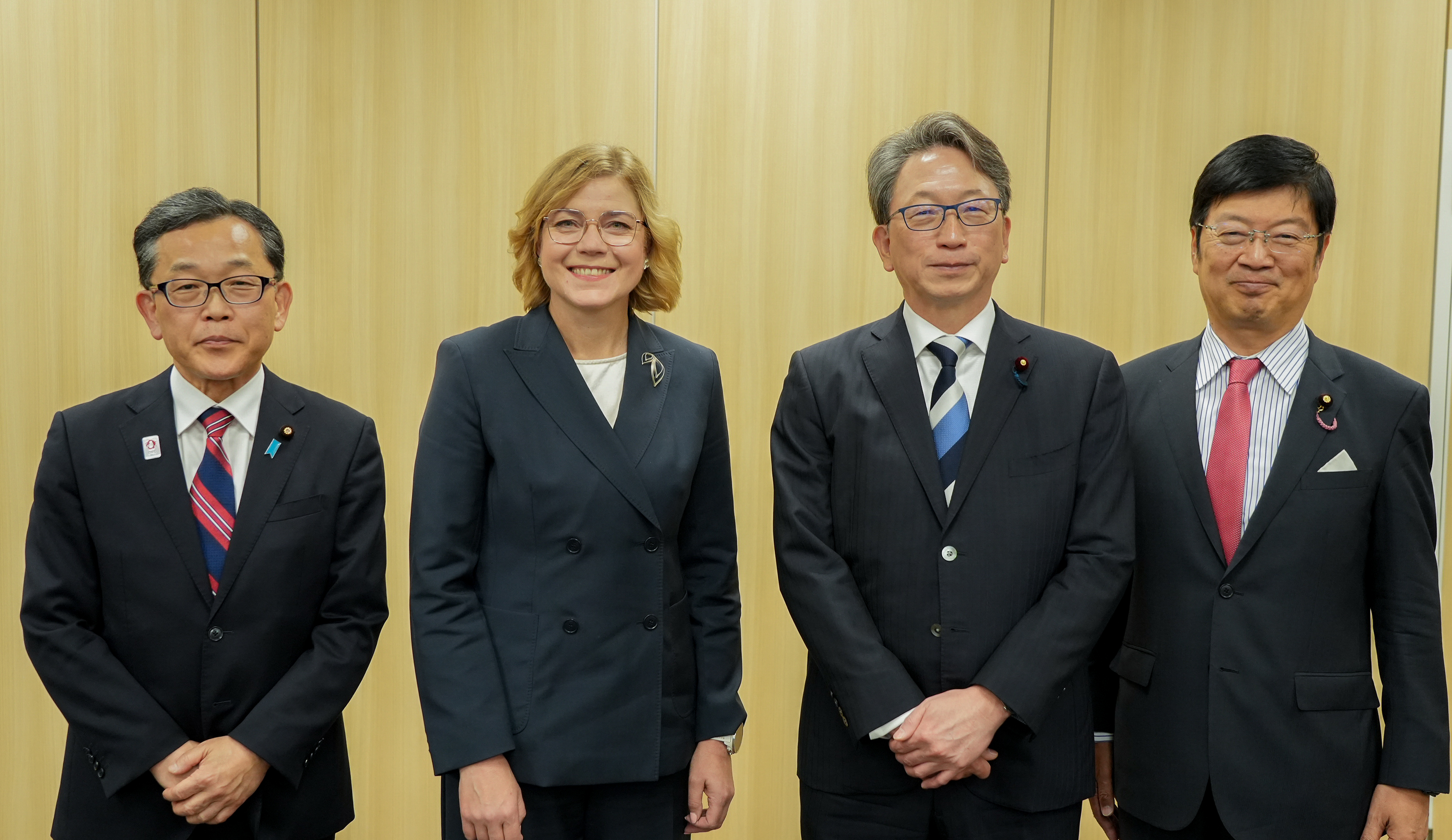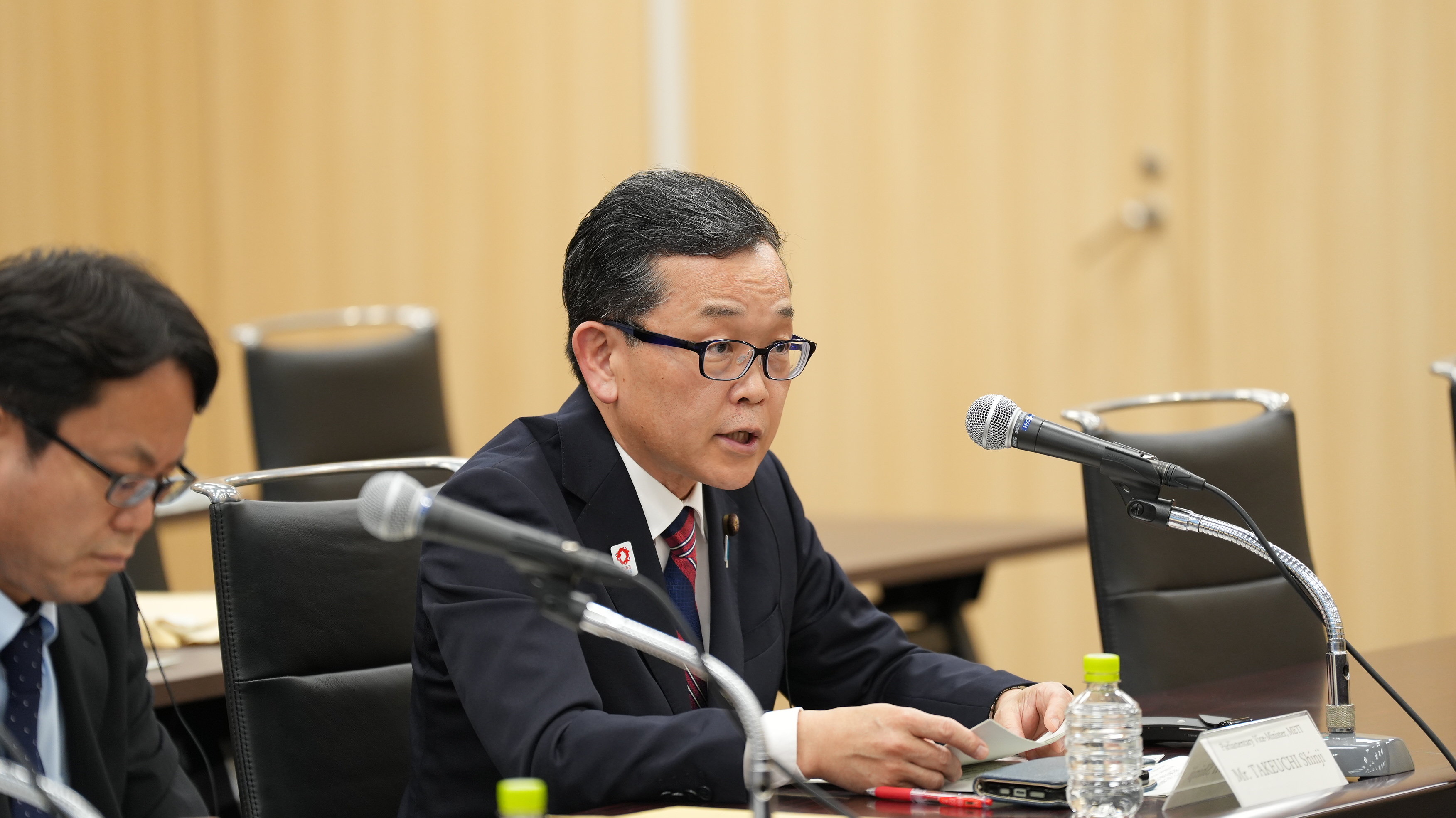- Home
- News Releases
- Back Issues
- May FY2025
- Third Ministerial Meeting of the Japan-EU Digital Partnership Council Held
Third Ministerial Meeting of the Japan-EU Digital Partnership Council Held
May 13, 2025
Joint Press Release with the Digital Agency and the Ministry of Internal Affairs and Communications
On Monday, May 12, 2025, the Ministry of Economy, Trade and Industry, the Digital Agency, and the Ministry of Internal Affairs and Communications held the third ministerial meeting of the Japan-EU Digital Partnership Council with the European Commission.
Overview of the meeting
The meeting was co-chaired on the Japanese side by Mr. Taira Masaaki, Minister for Digital Transformation, Mr. Adachi Masashi, State Minister of Internal Affairs and Communications, and Mr. Takeuchi Shinji, Parliamentary Vice-Minister of Economy, Trade and Industry, and on the EU side by Ms. Henna Virkkunen, Executive Vice-President of the European Commission for Tech Sovereignty, Security and Democracy. At the meeting, the representatives of Japan’s two ministries and one agency held discussions with the European Union and a joint statement was issued as an outcome of the discussions.
The key points of the statement are as follows:
1. Boosting competitiveness, innovation and resilience in emerging technologies through advancing cooperation in research and innovation
Semiconductors
Both sides confirmed their interest in collaborative research on finding safe and sustainable alternatives for chemicals such as PFAS in semiconductor manufacturing, on heterogeneous integration (*1) and chiplets, as well as on devices and processes beyond 2nm technology. Both sides are committed to exploring the opportunity of collaborative research on these topics in the near future.
5G, Beyond 5G/6G
A joint EU-Japan research project, called ‘6G MIRAI-HARMONY’, began in April 2025. Both sides recognised the importance of the joint research project and confirmed that further collaborative research on Beyond 5G/6G is to be considered in the future, taking into account the progress of the above-mentioned project.
On 5G, recognising the progress in the development of Open RAN in EU and Japan, both sides reconfirmed the importance of open and secure networks and promoting secure and diverse supply chains.
Quantum technology
Both sides welcomed the launch of a targeted research call for collaborative projects on quantum computing which addresses advanced algorithms and codes for academic and industrial applications. In addition, both sides welcomed the signature of the Letter of Intent on strengthening cooperation in the area of quantum science and technology between the European Commission on behalf of the European Union and the Cabinet Office of Japan to further enhance cooperation in the quantum field. Both sides look forward to the research project that has been selected and to the results of the cooperation, and welcomed the exchange of views on quantum communications technologies.
*1 Heterogeneous integration: a manufacturing technique in which different types of semiconductor chips are integrated into a single package
2. Leadership in shaping global digital governance and innovation for a humancentric and values-based approach
Artificial intelligence (AI)
Both sides reaffirmed their shared commitment to promoting innovation and safe, secure and trustworthy AI as well as working towards signing an Administrative Arrangement for further cooperation on AI.
Both sides reaffirmed the need to further advance the Hiroshima AI Process outcomes, to expand its outreach beyond the G7 and to continue exchanging information in the context of international AI governance initiatives.
Digital identities and trust services
Both sides continued the implementation of the Memorandum of Cooperation on Digital Identities and Trust Services to contribute to the implementation of Data Free Flow with Trust and welcomed the progress made towards concrete use cases. To pave the way for interoperability and mutual recognition of academic credentials through digital identity and trust services, both sides welcome the formulation of a scoping document based on which a pilot project could be launched to assess the technical feasibility.
Data governance
For improved data sharing, both sides began exchanges towards a possible joint working group. The working group will facilitate practical discussions on improved data sharing, including interoperability between common European data spaces and Japanese data spaces, for example in the automotive sector with the involvement of the private sector such as industry associations. Both sides envisage to explore measures that strengthen Data Free Flow with Trust as a means to build more resilient and reliable supply chains.
Protection of personal data
Both sides confirmed the steady progress in the ongoing talks to expand the scope of the EU adequacy decision for Japan to academia and research as well as to the public sector. Both sides welcomed the Joint Press Statement in which they confirmed that such talks have particularly advanced in the area of academia and research with the two sides confirming their commitment to progress within the next months with a view to concluding talks swiftly.
Online platforms
Both sides reemphasised the commitment to ensuring a safe online environment where the fundamental rights of users are protected. To that end, regulatory exchanges took place on effective online platform governance. Both sides confirmed their intention to deepen this cooperation in discussions between the Japan Ministry of Internal Affairs and Communications (MIC) and the European Commission’s Directorate-General for Communications Networks, Content and Technology.
Both sides continued their close cooperation to promote fair and contestable digital markets by holding regular technical exchanges on Japan’s Act on Promotion of Competition for Specified Smartphone Software and the EU’s Digital Markets Act. Both sides confirmed their intention to deepen and formalise this cooperation by working towards signing an Administrative Arrangement between the Japan Fair Trade Commission (JFTC) and the European Commission’s Directorate-General for Communications Networks, Content and Technology and the European Commission’s Directorate-General for Competition.
3. Enhancing economic security by promoting resilience in digital critical technologies
Cybersecurity
In particular, both sides welcomed expert cooperation on standard development activities for the EU’s Cyber Resilience Act and Japan’s IoT labelling scheme JC-STAR to facilitate the implementation of product security on Japanese and EU markets and acknowledged that in order to address the cybersecurity of Internet of Things products in its entirety, both technical and non-technical nature of cyber threats should be taken into account.
In addition, both sides will advance cooperation for the SBOM Global Joint Guidance and for training to enhance cybersecurity skills of the Indo-Pacific Region.
Both sides welcomed the fact that the next edition of the Cyber Dialogue would be held in Brussels, and the International Cybersecurity Challenge in Tokyo in 2025.
Submarine cables
Both sides reinforced the implementation of the Memorandum of Cooperation on submarine cables for secure, resilient and sustainable global connectivity. Both sides confirmed their intention to continue the implementation of the Memorandum of Cooperation on submarine cables through support actions that could include awareness raising, financial support (subject to the availability of resources), demand aggregation, and as appropriate, facilitating relevant administrative processes.
Semiconductors
On the economic security aspects of semiconductors, both sides enhanced the implementation of the Memorandum of Cooperation on semiconductors. Both sides confirmed their intention to further continue cooperation to maintain resilient and reliable semiconductor supply chains including through the established joint mechanisms as well as in the G7 semiconductors Point of Contact group for instance by tackling risks posed by non-market policies and practices.
4. A collaborative path of joint leadership in digital technologies under the EU-Japan Digital Partnership
Japan and the EU will continue the work in all areas identified at the third Digital Partnership Council.
Both sides confirmed their intention to take stock of the progress they will have achieved at the fourth Digital Partnership Council to be held in Brussels in 2026.


Related Material
Division in Charge
Office of International Affairs, Commerce and Information Policy Bureau